文学翻译 第三章 社会事件的翻译补充材料
翻译概论第三章
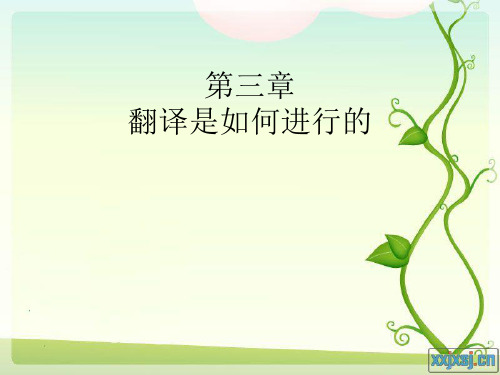
目录
• • • • 1 狭义的翻译过程 2 理解活动的基本特征 3 广义的翻译过程 4 文本生命的扩展与延伸
1. 翻译过程的概念
• 狭义的过程:翻译者对具体文本的转换活 动过程,即翻译者选择了一个要翻译的文 本之后,将该文本由出发语向目的语转换 的过程。 • 广义的过程:包括狭义的语言转换活动, 文本的选择、文本的生成和文本生命的历 程等。
2. 狭义的翻译过程
• 2.1 对狭义翻译过程的经验型认识 2.1.1 奈达的基本翻译过程 2.1.2 旅美翻译家思果对翻译的认识 2.1.3 俄罗斯文学翻译家草婴先生的看法 2.1.4 意大利文学翻译家吕同六的翻译与研究 的关系
2.1.1 奈达的基本翻译过程
翻译程序:
(1)分析原文 (2)将原语转换成译语 (3)重新调整译文 (4)约请有代表性的读者检验译文
释义学派:释意学派是20世纪60年代末产生 于法国的一个探讨口译与非文学文本笔译 原理与教学的学派。该派认为翻译即释意; 是译者通过语言符号和自己的认知补充对 原文意思所作的一种解释;译者应追求的 不是语言单位的对等,而是原文意思或效 果的等值:这种看法与语言学派(如 George Mounin等人)的观点差别颇大。该 派理论直接来源于口译实践,其观点对于 翻译研究有着独特的启示。
• 具体实际操作可分为8个步骤
(1)快速翻译,侧重文体
(2)初稿应搁置一周左右后再进行修改,以便译者在修改时能够获得全 新感受,并且对自己的译文作出评价 (3)认真检查译文内容,特别着重疑问的准确性和连贯性 (4)修改后译文要再搁置几天 (5)从文体上检查译文 (6)检查译文拼写、标点符号和格式 (7)疑问送交编辑或交出版商审阅 (8)采纳编辑或出版商提出的建议
大学语文UNIT3翻译
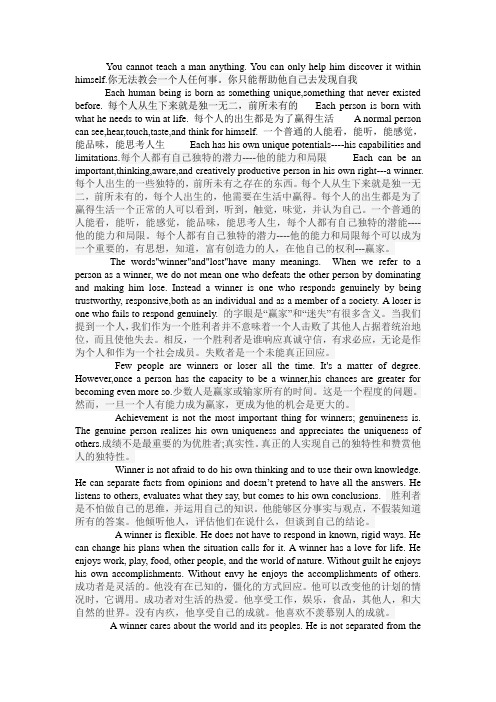
You cannot teach a man anything. You can only help him discover it within himself.你无法教会一个人任何事。
你只能帮助他自己去发现自我Each human being is born as something unique,something that never existed before. 每个人从生下来就是独一无二,前所未有的Each person is born with what he needs to win at life. 每个人的出生都是为了赢得生活 A normal person can see,hear,touch,taste,and think for himself. 一个普通的人能看,能听,能感觉,能品味,能思考人生Each has his own unique potentials----his capabilities and limitations.每个人都有自己独特的潜力----他的能力和局限Each can be an important,thinking,aware,and creatively productive person in his own right---a winner.每个人出生的一些独特的,前所未有之存在的东西。
每个人从生下来就是独一无二,前所未有的,每个人出生的,他需要在生活中赢得。
每个人的出生都是为了赢得生活一个正常的人可以看到,听到,触觉,味觉,并认为自己。
一个普通的人能看,能听,能感觉,能品味,能思考人生,每个人都有自己独特的潜能----他的能力和局限。
每个人都有自己独特的潜力----他的能力和局限每个可以成为一个重要的,有思想,知道,富有创造力的人,在他自己的权利---赢家。
The words"winner"and"lost"have many meanings. When we refer to a person as a winner, we do not mean one who defeats the other person by dominating and making him lose. Instead a winner is one who responds genuinely by being trustworthy, responsive,both as an individual and as a member of a society. A loser is one who fails to respond genuinely.的字眼是“赢家”和“迷失”有很多含义。
2011级文学翻译chapter 3.1-9.22
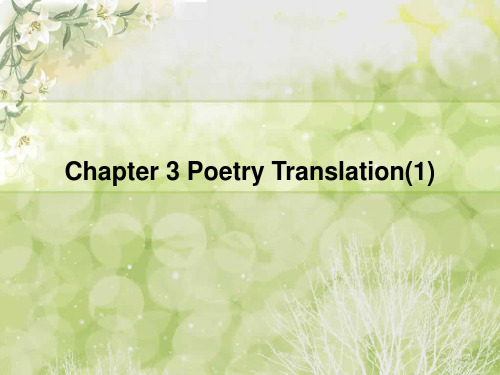
Objectives:
• 1. Know the types and elements of poetry; • 2. Improve abilities of appreciating British and American, Chinese representative poems; • 3. Do some translation practice of poems.
1.Early and Medieval English Poetry
• Beowulf : the first national epic • Epic史诗: about early history or the origin of a nation • Written by a Northumbrian monk • The plot: Hrothgar-king of the Danes Beowulf-a brave young man from southern Sweden • Grendel-a terrible creature • Heorot-the great hall 鹿厅
• -----Analects 17. 9
• 1.Instructing readers to think, act, believe, and do, providing enjoyment while teaching. (Horace) • 2.The function of poetry: lies in its power to give unexpected splendor (wonder) to familiar and common things. (William Wordsworth) • 3.Negative Capability: be comfortable with uncertainties, indeterminacies, mysteries, and doubts without needing to find some resolution or certainty. (John Keats)
第三章、社会事件的翻译(二、侯爵老爷在城里)

“我真不明白,”他说道,“你们这班人怎么连自己和 自己的小孩都管不住。你们当中总有人来挡我的道。我还 不知道你们把我的马弄出什么伤来没有哩!喏,把这给 他!” 他扔了一个金币在地上,让跟班去拣,所有的头都向 前探着,因而所有的眼睛都看到金币落在地上。那高大汉 子又用撕裂人心的声音狂喊道:“死了!” 众人让开路,一个男人急步走上前来,抓住了大汉。 那痛苦不堪的人一头扑倒在他的肩上,抽泣、嚎叫不止, 一面用手指着喷泉,那儿有几个女人正俯身照看那捆一动 不动的东西,在它周围轻轻地走动。她们也像男人一样, 个个默不作声。 “我都知道了,我都知道了,”那刚刚赶到的人说, “要像个坚强的男子汉,我的加斯帕!可怜的小东西这么 死了,倒比活着强。他没受一点罪一下子就死去了。他活 着时像这样痛快过一个钟点么?” 选自 狄更斯 著 《双城记》
文学翻译的考试题及答案
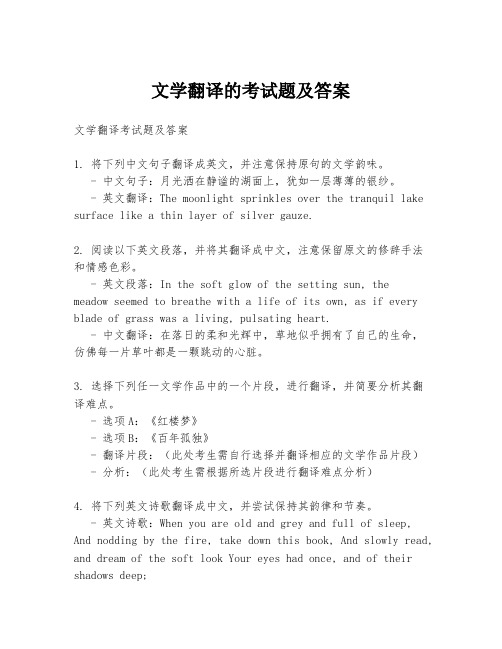
文学翻译的考试题及答案文学翻译考试题及答案1. 将下列中文句子翻译成英文,并注意保持原句的文学韵味。
- 中文句子:月光洒在静谧的湖面上,犹如一层薄薄的银纱。
- 英文翻译:The moonlight sprinkles over the tranquil lake surface like a thin layer of silver gauze.2. 阅读以下英文段落,并将其翻译成中文,注意保留原文的修辞手法和情感色彩。
- 英文段落:In the soft glow of the setting sun, the meadow seemed to breathe with a life of its own, as if every blade of grass was a living, pulsating heart.- 中文翻译:在落日的柔和光辉中,草地似乎拥有了自己的生命,仿佛每一片草叶都是一颗跳动的心脏。
3. 选择下列任一文学作品中的一个片段,进行翻译,并简要分析其翻译难点。
- 选项A:《红楼梦》- 选项B:《百年孤独》- 翻译片段:(此处考生需自行选择并翻译相应的文学作品片段)- 分析:(此处考生需根据所选片段进行翻译难点分析)4. 将下列英文诗歌翻译成中文,并尝试保持其韵律和节奏。
- 英文诗歌:When you are old and grey and full of sleep, And nodding by the fire, take down this book, And slowly read, and dream of the soft look Your eyes had once, and of their shadows deep;- 中文翻译:当你老了,头发花白,睡意沉沉,倦坐在炉边,取下这本书,慢慢读,梦想你眼中曾有的柔情,和那深深的影子;5. 评析以下中文翻译片段的质量,并提出改进建议。
文学翻译作业3-陆勇
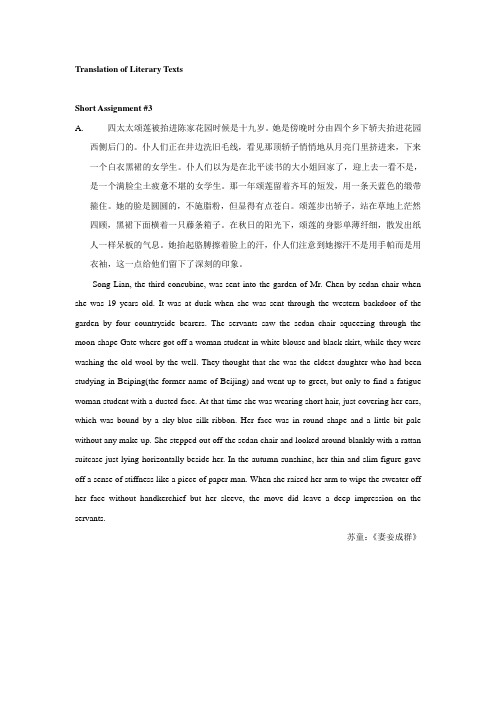
Translation of Literary TextsShort Assignment #3A.四太太颂莲被抬进陈家花园时候是十九岁。
她是傍晚时分由四个乡下轿夫抬进花园西侧后门的。
仆人们正在井边洗旧毛线,看见那顶轿子悄悄地从月亮门里挤进来,下来一个白衣黑裙的女学生。
仆人们以为是在北平读书的大小姐回家了,迎上去一看不是,是一个满脸尘土疲惫不堪的女学生。
那一年颂莲留着齐耳的短发,用一条天蓝色的缎带箍住。
她的脸是圆圆的,不施脂粉,但显得有点苍白。
颂莲步出轿子,站在草地上茫然四顾,黑裙下面横着一只藤条箱子。
在秋日的阳光下,颂莲的身影单薄纤细,散发出纸人一样呆板的气息。
她抬起胳膊擦着脸上的汗,仆人们注意到她擦汗不是用手帕而是用衣袖,这一点给他们留下了深刻的印象。
Song Lian, the third concubine, was sent into the garden of Mr. Chen by sedan chair when she was 19 years old. It was at dusk when she was sent through the western backdoor of the garden by four countryside bearers. The servants saw the sedan chair squeezing through the moon-shape Gate where got off a woman student in white blouse and black skirt, while they were washing the old wool by the well. They thought that she was the eldest daughter who had been studying in Beiping(the former name of Beijing) and went up to greet, but only to find a fatigue woman student with a dusted face. At that time she was wearing short hair, just covering her ears, which was bound by a sky-blue silk ribbon. Her face was in round shape and a little bit pale without any make-up. She stepped out off the sedan chair and looked around blankly with a rattan suitcase just lying horizontally beside her. In the autumn sunshine, her thin and slim figure gave off a sense of stiffness like a piece of paper man. When she raised her arm to wipe the sweater off her face without handkerchief but her sleeve, the move did leave a deep impression on the servants.苏童:《妻妾成群》B. September is more than a month, really; it is a season, an achievement in itself. It begins with August's leftovers and it ends with October's preparations, but along the way it achieves special satisfactions. After summer's heat and haste, the year consolidates itself. Deliberate September - in its own time and tempo -- begins to sum up another summer.With September comes a sense of autumn. It creeps it on a misty dawn and vanishes in the hot afternoon. It tiptoes through the treetops, rouging a few leaves , then rides a tuft of thistledown across the valley and away. It sits on a hilltop and hoots like an October owl in the dusk. It plays a tag with the wind. September is a changeling busy as a squirrel in a hickory tree, idle as a languid brook. It is summer’s ripeness and richness fulfilled.Some of the rarest days of the year come in the September season-days when it is comfortably cold but pulsing with life, when the sky is clear and clean, the air crisp, the wind free of dust .--- Hal Borlnd from “Sweet September”九月,不仅仅是一个月份,她更是一个季节,一个收获的季节。
文学英译汉( 哲理类散文)
文学英译汉(哲理类散文)What is leadership?Its qualities are difficult to define. But they are not so difficult to identify.什么是领导(力)?领导应具备什么样的素质,这很难精确地解说,但辨认直陈却也不难。
Leaders don’t force other people to go along with them. They bring them along. Leaders get commitment from others by giving it themselves, by building an environment that encourages creativity, and by operating with honesty and fairness.领导者不强制别人与自己协调一致,而是帮助他们跟上。
领导者让别人承担义务,首先自己承担义务,造成一种能鼓励创造的环境,待人诚恳,处事公正。
Good leaders aren’t lone rangers. They recognize that an organization’s strategies for success require the combined talents and efforts of many people. Leadership is the catalyst for transforming those talents into result.好的领导者不是独行侠。
他们认识到一个组织要获得成功,其方针在于把许多人的才能和力量集中起来。
领导艺术是一种催化剂,把众人的才智转化成业绩。
Successful leaders are emotionally and intellectually oriented to the future-not wedded to the past. They have a hunger to take responsibility, to innovate, and to initiate. They are not content with merely taking care of what’s already there. They want to move forward to create something new.成功的领导者,无论是在感情上还是在理智上都着眼于未来,而不是眷恋过去。
《《我挚爱的世界》(1-4章)英汉翻译实践报告》范文
《《我挚爱的世界》(1-4章)英汉翻译实践报告》篇一我挚爱的世界:英汉翻译实践报告第一章:引言本报告将探讨一个重要主题——《我挚爱的世界》。
该作品是一份涵盖多个层面、丰富多彩的英文翻译实践材料,主要通过对其中所涉及的文学风格、语言特色、文化背景等方面进行深度解读,进而探索其英汉翻译的过程和技巧。
该作品表达了对世界和生活的热爱,反映了作者对人生哲理的深刻理解。
本报告旨在通过分析翻译实践中的具体案例,总结出有效的翻译方法和策略,为今后的翻译工作提供参考。
第二章:原文分析《我挚爱的世界》是一部以散文形式呈现的作品,其内容丰富多样,包括对自然景观、人文历史、亲情友情的细腻描写,以及人生感悟和心灵思考等。
该作品的英文原作在语言运用上既有简单的句式和日常用词,又有深邃的文学词汇和句型结构,展现出了丰富而多变的语言特点。
因此,翻译该作品不仅需要对内容的深刻理解,还需注重语言的准确性和流畅性。
第三章:翻译过程及方法在翻译过程中,我们首先对原文进行了仔细的阅读和理解,深入挖掘作者的思想和情感。
然后,我们根据不同的内容特点,采用了不同的翻译方法和技巧。
例如,在处理自然景观和人文历史等描述性内容时,我们注重语言的优美和生动,力求传达出原文的意境和氛围;在处理人生感悟和心灵思考等深层次内容时,我们则更加注重语言的简洁明了和准确性,力求传达出原文的深层含义。
此外,我们还针对不同词汇的翻译进行了反复的推敲和尝试。
对于一些专业性或具有特定文化内涵的词汇,我们查阅了大量相关资料和文献,力求找到最准确的翻译。
对于一些具有象征意义或比喻性的表达方式,我们则结合上下文进行理解,并尝试用类似的表达方式在中文中传达出其含义。
第四章:案例分析接下来,我们将结合具体案例来进一步分析《我挚爱的世界》的翻译方法和技巧。
例如,在翻译“I love the world with all its flaws”这一句时,我们将其译为“我深爱着这个有缺陷的世界”,准确传达了原文的含义。
第3章 比较文学与翻译研究 (《比较文学概论》PPT课件)
Three
本讲纲要
一 比较文学视野中的翻译 二 创造性叛逆与翻译
三 文化意象的失落与变异 四 翻译文学与中外文学关系研究新 视角
导言
比较文学与翻译研究
翻译文学国别归属、翻译文学史、 文学翻译史
文化意象的失落、 扭曲、变异
“翻译总是一种创 造性叛逆”
译介学
对20世纪国际比较文学 界产生了重要的影响
(二)东方比较文学的崛起与翻译地位的上升
西方对东方文学(特别是中国文学)的重视
进入20世纪 开始较多地翻译出版中国文学作品和文 化典籍
20世纪后半叶 中日韩印为代表的东方比较文学的崛起
大多不谙东方语言的西方比较文学家 意识到了翻译的重要性并开始重视对翻译的研究。
例:阿·托尔斯泰的名作《苦难的历程》的英译名 是“Road to Calvary”,英译者故意用一个含有具 体象征意义的地名“Calvary” ,代替了俄文中那 个泛指“苦难、痛苦”的普通名词“мука”。
(二)创造性叛逆的类型
译者的创造性叛逆
节译与编译 二者都属于有意识型的创造性叛逆,混杂难分。 造成节译与编译的原因:为与译入国的习惯、风俗 相一致,为迎合译入国读者的趣味,为便于传播,或出 于道德、政治等方面因素的考虑,等等。
(三)从比较文学到翻译研究
翻译转向的实质 文化转向!
翻译研究 文化研究
都质疑学科的边界, 都开创了自己新的空间 都关注权力关系和文本生产 都认识到理解文本生产过程中操纵因素的重要性
相必 遇然
因此这两个学科的学者可以在很多领域进行更富有成果的合作。
(三)从比较文学到翻译研究
翻译界的新研究课题
打开了一个新的研究层面 更深刻、更具体的阐释 为什么有些国家的文化更重视翻译,翻译进来 的东西多,而有些国家的文化则相反? 哪些类型的作品会被翻译?这些作品在译语系 统中居何地位? 我们对每个时期的翻译传统和翻译规范有何认 识?
文学翻译3
1.Those visitors wander into the church and look around aimlessly. They come out onto the village green and photograph each other in a stone armchair said to be the throne of Attila. They relentlessly tear at the wild roses which one has seen in bud and longed to see in bloom and which, for a day have scented the whole island. As soon as they are picked the roses fade and are thrown into the canal. (excerpt from Nancy Mitford’s The Water Beetle)游客们在教堂里尽情畅游,漫无目的地四处张望。
他们来到村中草地,在石扶手椅上互相拍照留影,据说这石椅曾专属于一位匈奴国王。
游客们无情地撕扯那些野玫瑰花,殊不知它们有的正含苞待放,有的正等待在未来的某一天芳香整片小岛。
这些花儿一被摘下就都枯萎了,接着又被扔进运河之中。
2.Ralph was a small man with wispy white hair and a baby-pink complexion. Behind the enormous oak desk of his library he looked like a midget. The dictionaries and thesauri stacked on either side of him added the effect of framing his face, so that he looked like a midget peering over a window sill. His usually vacant eyes were clouded with resentment. (excerpt from Leonard F. Hilts’ Murder at the Crosswords)拉尔夫是这样一位小老头:他有着稀疏的白头发,面容却似婴儿一般粉嫩可爱。
- 1、下载文档前请自行甄别文档内容的完整性,平台不提供额外的编辑、内容补充、找答案等附加服务。
- 2、"仅部分预览"的文档,不可在线预览部分如存在完整性等问题,可反馈申请退款(可完整预览的文档不适用该条件!)。
- 3、如文档侵犯您的权益,请联系客服反馈,我们会尽快为您处理(人工客服工作时间:9:00-18:30)。
称谓 一、亲属的称谓
brother sister parent father uncle niece nephew 兄、 弟 姐、妹 父、 母 parents 双亲 父 mother 母 伯、叔、 舅、姨丈、姑丈 侄女、甥女 侄、甥
father-in-law 岳父、翁(公公)、丈人 mother-in-law 岳母、姑(婆婆)、丈母娘 brother-in-law 内兄、内弟、大伯、小叔、姐夫、 妹夫、连襟 sister-in-law 大姑、小姑、大姨、小姨、嫂子、 弟妹、妯娌、舅嫂 cousin 堂兄、堂弟、堂姐、堂妹、表兄、表弟、 表姐、表妹 二、英汉称谓 I (me) 谦称——卑人、兄弟、弟、孩儿、学生、 老纳、老娘、老子、老汉、奴家等
he 他 she
(明清小说里)
他
她
it
它、牠
尊称——我、老子、老爷、咱家、杂家、洒家 you 你:敬称(单数)您、你老、您老人家、先 生、夫人、太太、小姐、老师、教授、部长、 、 阁下
你们:台端、先生您、夫人您、教授您等。 (复数)诸位、诸位先生、诸位小姐、 诸位委员等。
亲近称:(单) 你、汝、尔 (复)你们、大家、尔等、汝等。 卑称:(单)你、汝、尔、你这小子、你这东西 等。 (复)你们、汝等、尔等、你们这帮小子、 你们这群东西等。
